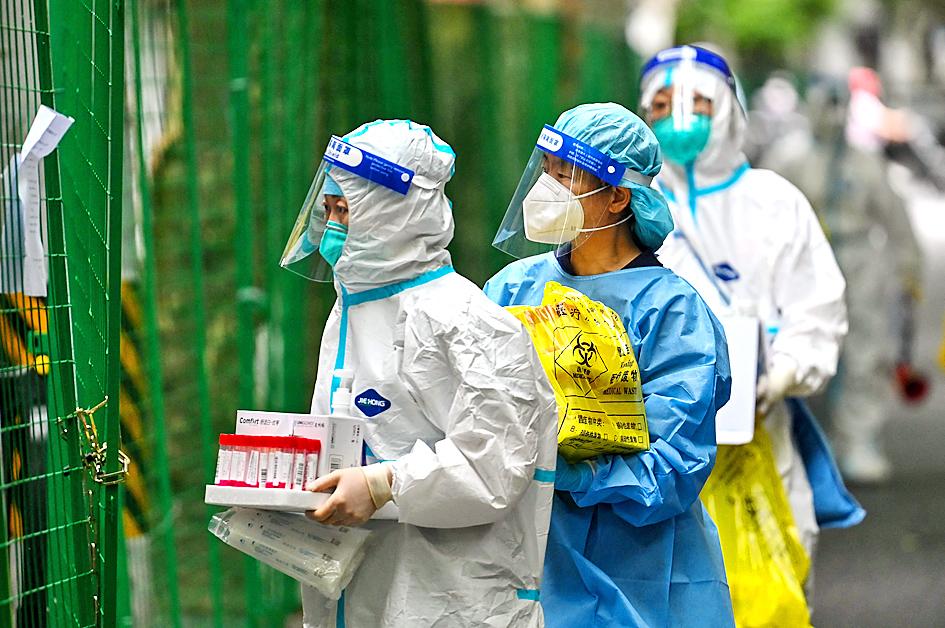Hazmat-suited workers poke plastic swabs down millions of throats in China each day, leaving bins bursting with medical waste that has become the environmental and economic levy of the nation’s “zero COVID-19” strategy.
China is the last major economy wedded to stamping out infections no matter the cost. Near-daily testing is the most commonly used weapon in an anti-virus arsenal that includes snap lockdowns and forced quarantines when just a few cases are detected.
From Beijing to Shanghai, Shenzhen to Tianjin, cities are now home to an archipelago of temporary testing kiosks, while authorities order hundreds of millions of people to get swabbed every two or three days.

Photo: AFP
Mass testing appears set to stay as Chinese authorities insist “zero COVID-19” has allowed the world’s most populous nation to avoid a public health catastrophe, but experts say the approach — a source of political legitimacy for the ruling Chinese Communist Party — creates a sea of hazardous waste and a mounting economic burden for local governments, who must plow tens of billions of dollars into funding the system.
“The sheer amount of medical waste that is being generated on a routine basis [is] at a scale that is practically unseen in human history,” said Li Yifei (李逸飛), an environmental studies expert at New York University Shanghai. “The problems are already becoming astronomical, and they will continue to grow even bigger.”
Beijing has positioned itself as an environmental leader, cracking down on air and water pollution while setting the goal of making its economy carbon neutral by 2060, a target experts say is untenable given the current trajectory of investments in coal.
Blanket-testing is now posing a new trash challenge.
Each positive case — typically a few dozen a day nationwide — unspools a trail of used test kits, masks and personal protective equipment.
If not disposed of properly, biomedical waste can contaminate soil and waterways, posing threats to the environment and human health.
Cities and provinces home to about 600 million people have announced some form of routine testing in recent weeks, according to an analysis of government notices and Chinese media reports.
Nationwide data on the waste footprint has not been disclosed, but Shanghai officials last month said that the city produced 68,500 tonnes of medical waste during its COVID-19 lockdown, with daily output up to six times higher than normal.
Under Chinese regulations, local authorities are tasked with separating, disinfecting, transporting and storing COVID-19 waste before finally disposing of it — usually by incineration — but disposal systems in the poorer rural parts of the nation have long been overburdened.
“I’m not sure that ... the countryside really has the capacity to deal with a significant increase in the amount of medical waste,” said Huang Yanzhong (黃嚴忠), a senior fellow for global health at the Council on Foreign Relations.
The spike in waste might prompt some local governments to process it improperly or simply “dump it on the ground” in temporary landfills, said Benjamin Steuer of the Hong Kong University of Science and Technology.
In a statement, the Chinese Ministry of Health and Welfare said that it had made “specific demands for medical waste management” as part of national COVID-19 protocols.
Beijing has urged provincial capitals and cities with at least 10 million people to set up a test site within 15 minutes’ walk of every resident.
Top leaders also expect local governments to foot the bill for testing at a time when many are struggling to balance the books.
Expanding the model to the whole of the nation could cost between 0.9 and 2.3 percent of China’s GDP, Nomura analysts said last month.
“The economics of that is tricky,” Li said. “You don’t want to invest in permanent infrastructure to process what is perceived as a short-term surge of medical waste.”
Jin Dong-yan (金冬雁), a professor at Hong Kong University’s School of Biomedical Sciences, said “very ineffective and costly” routine testing would force governments to back away from other much-needed healthcare investments.
Authorities are also likely to miss positive cases as the Omicron variant of SARS-CoV-2 spreads rapidly and is harder to detect than other strains, he said.
“This will not work,” he said. “It will just wash down millions of dollars into the sea.”

James Watson — the Nobel laureate co-credited with the pivotal discovery of DNA’s double-helix structure, but whose career was later tainted by his repeated racist remarks — has died, his former lab said on Friday. He was 97. The eminent biologist died on Thursday in hospice care on Long Island in New York, announced the Cold Spring Harbor Laboratory, where he was based for much of his career. Watson became among the 20th century’s most storied scientists for his 1953 breakthrough discovery of the double helix with researcher partner Francis Crick. Along with Crick and Maurice Wilkins, he shared the

China’s Shenzhou-20 crewed spacecraft has delayed its return mission to Earth after the vessel was possibly hit by tiny bits of space debris, the country’s human spaceflight agency said yesterday, an unusual situation that could disrupt the operation of the country’s space station Tiangong. An impact analysis and risk assessment are underway, the China Manned Space Agency (CMSA) said in a statement, without providing a new schedule for the return mission, which was originally set to land in northern China yesterday. The delay highlights the danger to space travel posed by increasing amounts of debris, such as discarded launch vehicles or vessel

IMPASSE: US President Donald Trump pressed to end the filibuster in a sign that he is unlikely to compromise despite Democrat offers for a delayed healthcare vote The US government shutdown stretched into its 40th day yesterday even as senators stayed in Washington for a grueling weekend session hoping to find an end to the funding fight that has disrupted flights nationwide, threatened food assistance for millions of Americans and left federal workers without pay. The US Senate has so far shown few signs of progress over a weekend that could be crucial for the shutdown fight. Republican leaders are hoping to hold votes on a new package of bills that would reopen the government into January while also approving full-year funding for several parts of government, but

TOWERING FIGURE: To Republicans she was emblematic of the excesses of the liberal elite, but lawmakers admired her ability to corral her caucus through difficult votes Nancy Pelosi, a towering figure in US politics, a leading foe of US President Donald Trump and the first woman to serve as US House of Representatives speaker, on Thursday announced that she would step down at the next election. Admired as a master strategist with a no-nonsense leadership style that delivered for her party, the 85-year-old Democrat shepherded historic legislation through the US Congress as she navigated a bitter partisan divide. In later years, she was a fierce adversary of Trump, twice leading his impeachment and stunning Washington in 2020 when she ripped up a copy of his speech to the